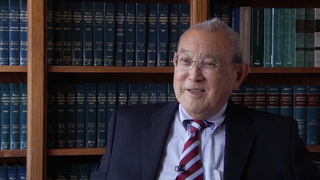Interviews
Understanding anti black racism in high school
I remember we would run around town and we just have so much fun. And I actually asked him one day, you know, “Hey Columbus, why is it that all of the Black people, they're not like Japanese people, you guys will break into a song, you know and start dancing down the street.” I said, “I thought the only did that in an MGM Musical.” and he said, “Yamamoto, it’s like this,” he says—and he used to...and they used to call it negro, that was the name back then, back in the fifties—he said, “when you a negro everybody’s going be down on you.” He said, “you could be the greatest person, they will be down like on you, you could be a terrible person they going to be down on you so you can do whatever you want because people going to be down on you anyway, so why not dance and sing down the street?” And I remember reacting to that like that’s not very good, people are going to be down on your anyway. That’s a really fucked up form of freedom. You’re free because you’re not free, you’re free because everyone’s going to hate you anyways.
Man, you know, it really brought home to me knowing things were happening that were not happening to me in my community because I would go riding with Columbus, his older brother had a car and we would go drive around in the car. You couldn’t drive in certain places at night time. You couldn’t drive in Glendale. You couldn’t drive in any White Community after six o'clock at night, or else you would automatically get stopped. It's not like we can get started in labor. It’s amazing how they were always the cops...they would take one look at me and say what are you doing with those people, we don’t have trouble with you people. I just say those are my friends. So if you hang around those people we’re going to treat you just like we treat them they said, okay, you know, not that I wanted that but that was the way it goes, you know, but it was an education to see how differentially people get treated.
Date: July 14, 2020
Location: California, US
Interviewer: Matthew Saito
Contributed by: Watase Media Arts Center, Japanese American National Museum; Japanese American Bar Association
Explore More Videos




Postwar school-life
(b. 1930) Half Japanese and grew up in both Japan and the United States.

Fifty Years and Going Strong
(1938-2020) Japanese American attorney and civil rights activist

Re-examining Identity
(1941-2018) Japanese Canadian photojournalist and activist

Being Denied as a Japanese American Lawyer
(b. 1934) The First Japanese American Appointed to the U.S. Court of Appeals.

Conflicted about immigrating to America (Japanese)
(b. 1925) War bride



Discrimination faced in San Francisco (Japanese)
(b. 1937) A war bride from Yokohama

The difference between Nikkei community in Oizumi and Brazil (Japanese)
(b. 1979) Sansei Nikkei Brazilian who lives in Oizumi-machi in Gunma prefecture. He runs his own design studio.

Accepted by Japanese society as I learned more Japanese (Japanese)
(b. 1979) Sansei Nikkei Brazilian who lives in Oizumi-machi in Gunma prefecture. He runs his own design studio.

Growing up Japanese in Hawaii
(b. 1952) Former banking executive, born in Hawaii

